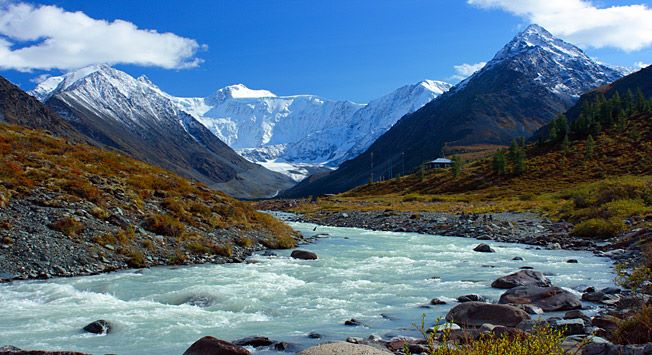BIO-CLIM: RIVERINE INVERTEBRATES AS BIOLOGICAL INDICATORS OF CLIMATE DRIVEN CHANGES ALONG ENVIRONMENTAL GRADIENT WITHIN THE GLACIARIZED KURAY WATERSHED IN ALTAI, RUSIA

The significant warming of the Arctic and Alpine regions during the last decades has made a strong impact on glacier-fed stream ecosystems that experience extreme changes in resilience and resistance of their biota as they are settled in a relatively narrow cold climate band. Warming is expected to have a strong impact on river ecosystems from glaciarized watersheds, via shifts in water temperature, alterations in the precipitations, rivers flow regimes and runoff, oscillations in surface-groundwater exchanges within the riverbed interstitial sediments and riverbed stability. BIO-CLIM aims at depicting the environmental and biogeochemical factors involved in setting the aquatic invertebrates from distinct compartments of a glacier-fed river from the Kuray basin in the high Altai Mountains; detecting the species distribution on longitudinal gradient from the glacier outlet downstream; and outlining the responses of communities to changes in environmental settings and to continuous permafrost. We start from the assumption that the biodiversity is based on the ‘glacier-heterogeneity-diversity’ paradigm, stating that there is high a-diversity at intermediate levels of glacial influence due to the high degree of environmental heterogeneity across a glaciality gradient. Understanding the relationships between different environmental variables and functional composition and biodiversity of communities from distinct compartments of glacier-fed streams settled in Alpine and Arctic regions could help in predicting the changes in functionality in the context of the current alarming climatic shifts. BIO-CLIM is an EU-INTERACT project financed by EU within the program International Network for Terrestrial Research and Monitoring in the Arctic. BIO-CLIM will be developed during summer 2018 in the Kuray Watershed of the Altai Mountains. Team members: Tadeusz Namiotko, University of Gdansk (Poland), Sanda Iepure, Imdea Water (Spain), Alvaro Vasquez.
ARCTICOSCOP: ARCTIC OSTRACODS AND COPEPODS OF THE HYPORHEIC ZONE IN SWEDISH LAPLAND – ASSEMBLAGES’ RESILIENCE AND SHELL CHEMISTRY

The resilience of hyporheic biota in Arctic streams is strongly controlled by long-lasting stress related to persistently low water temperatures, prolonged ice-cover, permafrost occurence, strong freeze-thaw cycles, nutrient availability, and frequent disturbance of their physical habitats. Consequently, the structural pattern of hyporheic biota is distinct in biodiversity, ecology, morphological, life-cycle and behavior adaptations in order to ensure their resistance and persistence under adverse environmental conditions. The hydrological and chemical processes occurring in the hyporheic zone in Arctic streams have received increased attention in recent years, yet the studies on primary succession of biotic assemblage and their response to cope with extreme environmental conditions are still scarce.

The ArticOsCop project funded through the European Union’s INTERACT funding scheme will assess the effect of habitat instability and changing environmental settings on the resilience of ostracod and copepods communities from the hyporheic zone in glacier-fed rivers. During July 2104 we will conduct our research in the Storglaciaren valley at the Tarfala station (Swedesh Lappland). We will perform a combination of field monitoring surveys – biota, water discharge, temperature, sediment structure, (geo)chemical analyses of water, sediments analyses (via CHNS/O elemental analyzes; micro-XRF and susceptibility) and ostracods shell geochemistry (Mg/Ca, Sr/Ca and 13C/12C).
See more:
https://sandaiepure.wordpress.com/
Publications:
Iepure, S., Lillo Ramos J. 2014. State of the art of hyporheic invertebrates from glacial-feed streams in two contrasted scenarios, Workshop: Ecology of Glacier Forelands, September 17-21, Alpine Research Centre, Obergurgl, Austria.